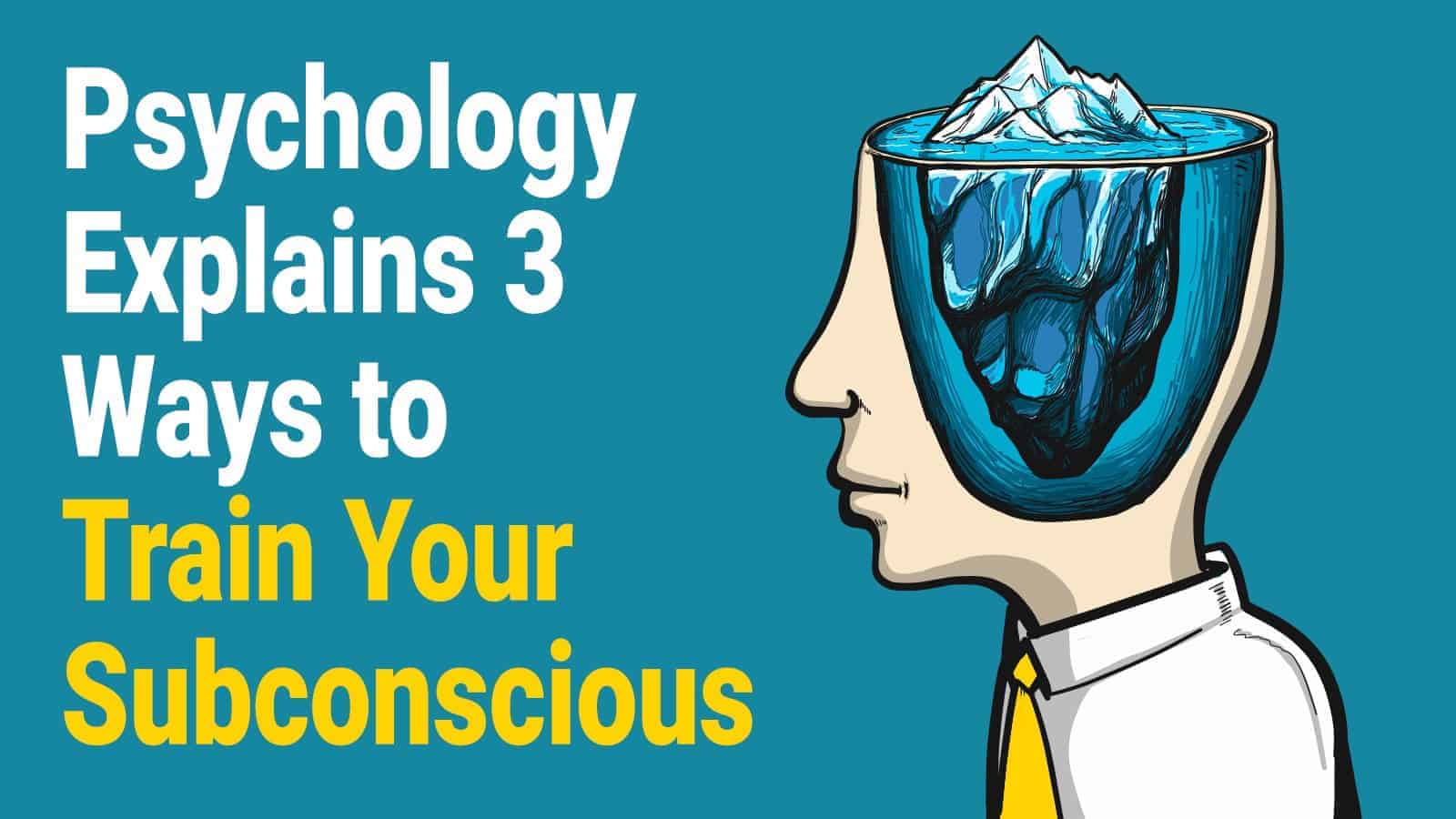The human mind is a powerful thing, and the subconscious part of it is just as influential. It’s truly amazing what it is capable of. Thoughts, values, and perceptions you’re unaware of can change your entire day, month, year, or even life.
The problem is that, since it’s your subconscious, you might not feel in control of it. You may not even know that it affects your brain, body, and psyche. It could make your life much more difficult, and you would have no idea!
Worse still, you may be completely aware that your subconscious thoughts and emotions are holding you back. But because they’re so deeply rooted, you have no idea how to change them or how to stop them from coming into play at every turn.
The good news is that it is perfectly possible to alter your innermost thoughts and feelings to suit your needs better and help you create yourself into the person you want to be. This can inspire a more positive outlook on life and make room for self-improvement, which we should all strive for.
Psychology Explains 3 Ways To Train Your Subconscious
1. Meditation
Many people roll their eyes at the idea of meditation, but the fad-like stereotypes associated with the practice are largely unwarranted. Meditation is an extremely powerful tool for your brain, and it’s one of the easiest ways to retrain your mind subconsciously.
When you meditate, you let go of any and all distractions, whether they are present internally or externally. It forces you to forget your worries for just a few minutes and be at peace, which is good for your mental health and a great way to get in touch with your subconscious.
Meditation is also great for your spirituality. If you don’t buy into that, you’ll be pleased to know that it also promotes psychological stability. Essentially, it helps you break down mental walls within your brain, allowing you to self-reflect and be in touch with parts of your thoughts that you usually don’t connect with.
But is there any scientific evidence that shows meditation works? Yes! A study conducted on Buddhist monks proved this much. Entitled “Buddha’s Brain: Neuroplasticity and Meditation” and published in the IEEE Signal Process in January 2008, this study showed just how much of a positive effect meditation can have on the mind and the body.
The study conducted MRI scans on these monks, who have been practicing the art of meditation for decades upon decades. Here are some of the findings:
· Neuroplasticity
Scans revealed high levels of neuroplasticity and very high activation of the brain. This means that their brains have a higher capability of rearranging itself, altering the structure, adapting to change and experience, and functioning well.
· Empathy and Happiness
Thanks to this study, meditation is scientifically proven to improve positive thinking. It boosts your capacity to experience and feel joy and happiness; this, in turn, makes you more empathetic toward others.
· Connectivity
Study results indicated that monks can use their extrinsic networks in the brain in coordination with the intrinsic ones. Extrinsic networks focus on outward interactions, while intrinsic ones focus on feelings and are crucial for reflection.
· General changes
With a brain that is this much more open, expanded, and unlocked, there are tons of new things that the brain is capable of, making a huge difference between those monks and the average, non-meditating person.
Meditation gets a bad reputation as either new-age nonsense or ancient non-scientific drivel. Still, it’s not necessarily about spirituality and tradition – it’s about letting your brain slow down and rest, so it can gather your thoughts and help you better in the future.
2. Affirmation
Affirmations are positive statements that you tell yourself repetitively to influence yourself and alter your subconscious to align with these statements. However, a certain amount of care goes into making affirmations. If you’re not specific enough, you could lower their effectiveness or wind up even worse off.
That’s why many people practice something known as precision affirmation. This involves using a very clear and specific statement that describes something you’re aiming for or want to switch your subconscious to. You then will speak this affirmation again and again with confidence, as if that affirmation is already true.
At first, it can be difficult to make yourself believe in and have confidence in some of these affirmations. But as you continue to say them, you’ll begin to believe in them with all your heart – which will cause them to work. Your brain will start to believe those positive affirmations; before you know it, it will begin integrating these thoughts into its neural system and, therefore, your subconscious.
Why does this work so well? Surely positive thinking alone can’t reprogram your entire brain? Surprisingly, when done well, it can! This is because your subconscious cannot actually discern the difference between what is truly happening and what you simply imagine vividly. That’s why subconscious thoughts that aren’t “real” remain powerful despite their falseness.
So put these affirmations into practice and follow them with thought, passion, and action. Your brain will soon begin to believe that those affirmations are real, and before long, they will manifest in reality! You just have to have faith and confidence in yourself and your thoughts. When you believe in yourself, anything can happen. Here are some examples of affirmations that may work for you.
- I have excellent health in my body, mind, and soul.
- I will grow my business until I enjoy financial independence.
- My choice is to care for myself well every day.
- I am highly intelligent and utilize this knowledge every day.
- I think logically and carefully and make excellent decisions.
- Productivity and responsibility at work are in my power to accomplish.
If you want to get highly specific, these precision affirmations may work for you:
- I am happily driving my brand new (insert dream car here) down a road in (insert dream home location).
- I am incredibly joyful that I have reached my goal weight of 120 lbs.
- I’m celebrating the fact that I have successfully kicked my smoking habit!
- I am grateful that I work as a (insert dream job here) at (insert dream company here).
- I’m thrilled to be earning a salary of (insert goal salary here).
- I love my gorgeous (insert type of house here) in (insert dream location here).
Of course, no one can be happy all the time. There will be days when it feels like being positive is impossible. This doesn’t mean you’re supposed to force it to gain a good outcome. It just means that you need to learn to use affirmations to stop yourself from dipping down into a very sad or dark period, as these periods can be easy to get lost in and may halt or reverse your progress.
While we cannot communicate back and forth with the subconscious mind, suggestion and affirmation are two ways you can coax it into responding and changing. If you need assistance starting your positive thinking, begin by maintaining a neutral thought process.
Stop yourself from thinking bad, hateful, or negative self-deprecating thoughts. Catch bad thought patterns and take steps to change them. Talk to a therapist if you need to! The rest will follow in time.
3. Listen, Learn, and Apply
Many beat down their innermost emotions and feeling-based thoughts as they attempt to focus on logic and reason. There’s nothing wrong with being logical, but if you neglect your feelings and only give attention to your thinking side, you’ll wind up incapable of self-reflection and improvement.
Of course, there’s a flip side to this. If you’re too focused on feelings and emotions, you could wind up overreacting and dwelling on the past. You may wallow in self-hatred or guilt for ages when you make mistakes. Or if something doesn’t go your way, you may resent it forever, allowing it to cloud your judgment.
What you have to do instead is simply learn to listen to your emotions. If an unexpected situation happens, examine how you feel or think about it. Consider your feelings and weigh them against rationality to see which ones are rooted in inaccuracies or subconscious negative thoughts.
- Validate your feelings, and don’t bottle them up.
- Understand that you are allowed to feel this way, and listen to your mind as it tells you its problems.
- Acknowledge that these issues are real, and move them to a more logical approach.
- What lessons can you learn from this?
- How can you avoid something like this in the future?
- What values do you have that led to this?
- Do you still stand by them?
Next, apply these new lessons to your life. If you’ve decided there is a way you can improve yourself, do so. Apply your thoughts to your everyday living so you improve each time.
Self-reflection is crucial to self-improvement, so take some time every week – or even every day – to perform some. Focus on positive thinking and finding solutions to enjoy a productive reflective session.
Final Thoughts On Ways To Train Your Subconscious
There are a lot of difficult aspects to life, and the last thing you need is for your subconscious to weigh you down. That’s why it’s so important to change the way your mind goes down neural paths.
Of course, we know that this is easier said than done. Don’t feel ashamed if it takes you a while to succeed or if you need the assistance of a medical professional to deal with bad thoughts and struggles. Sometimes, years and years of negativity can make it difficult to change for the better.
At the end of the day, by adjusting your brain to focus on positive thinking, you’ll be doing yourself a huge favor. By utilizing these three ways to train your subconscious, you’ll be helping your brain stay strong and positive; this will, in turn, help your mind.



















